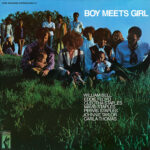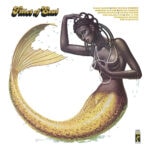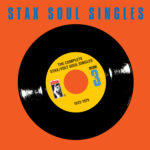Stax Compilations
Come Go With Me: The Staple Singers

Among the innovations frequently associated with Stax Records’ contributions to the cultural lexicon in the 1960s and ’70s, the blend of gospel, soul, street-wise lyricism, and political action known as “message music” remains an underrated creative advent. At the helm of this phenomenon, The Staple Singers melded their traditional spiritual roots from Mississippi with a big-city swing to great success on the label. The seven-CD box set, Come Go With Me: The Stax Collection, chronicles the group’s creative peak as part of the Stax family and demonstrates their prolific rise from a traveling family band to music industry royalty.
The vision for The Staple Singers began with the group’s patriarch, Roebuck “Pops” Staples, who migrated from the rural surroundings of 20th-century Winona, Mississippi, to a new life in Chicago. Along with the enticing call of urban living, music beckoned for the elder Staples, whose initial ambitions lay in the blues. Upon the birth of Cleotha, Pervis, Yvonne, Mavis, and Cynthia with his wife Oceola, the Staples’ household soon buzzed with the makings of several spirited students under Pops’ musical tutelage.
After a debut in church quickly inspired an enterprising Pops to record his squadron of young voices on his own, record labels soon came with offers to release The Staples family’s music. After a handful of releases with the popular Vee-Jay label in the 1950s and early 1960s, Pops turned his sights on a new label home for his budding band. The group eventually ventured into releases on Riverside and later Epic Records. Following his transition from a hip DJ to a record salesman, Al Bell recruited the group to Stax Records to capitalize on The Staples’ growing appeal with secular audiences, as their early output leaned into folk and R&B aesthetics.
Come Go With Me: The Stax Collection follows the group’s output in chronological order, beginning with 1968’s Soul Folk in Action, The Staple Singers’ debut album at Stax. Produced by Steve Cropper, the record captures the label’s initial attempt to transition The Staple Singers fully from the family’s gospel roots into a force in the growing soul-music sphere. Recorded in accordance with much of the music of Stax’s mainline acts in the 1960s, each track finds the iconic group backed by Stax’s house band, Booker T. & the M.G.’s. The album mixes covers like Otis Redding’s “(Sittin’ On) The Dock of the Bay,” with original material that allowed the group to speak directly to the principles of the ongoing civil rights movement. The Staple Singers sing in the abstract about love among the community on “Got to Be Some Changes Made,” while also focusing more directly on policymaking via “Long Walk to D.C.”
Cropper gave a second go at producing the Staple Singers on We’ll Get Over in 1969. Standout track “When Will We Be Paid” pairs groovy rhythm work and uplifting melody with a sobering look at the plight of African Americans. In it, The Singers call for reparations in exchange for the toiling Black citizens faced since enduring slavery. Furthermore, the group delve deeper into the experimental, allowing their rendition of “Wednesday in Your Garden” to make way for an original called “The Gardner.” Elsewhere on the album, The Staple Singers try their hand at “Solon Bushi (Japanese Folk Song),” marking a continued interest in breaking conventions. Before the album’s runtime is complete, they also try their hand at the Sly Stone hit “Everyday People,” communicating the ubiquitous nature of the beloved tune while highlighting its useful sociopolitical core.
With Pervis Staples cycling out of the group in 1970, The Staple Swingers is the first of the group’s albums on Stax to feature Staple sibling Yvonne. With the label nearly losing the group due to dissatisfaction within the Staples family with their first two albums produced by Cropper, Al Bell elected to take the reins for their third release. Swingers marked a deeper investment in a funkier beat, along with a move from the Stax studios in Memphis. Instead, the label enlisted writers, producers, and musicians in Muscle Shoals, Alabama, to complete the album’s production.
Interested in a bona fide crossover hit, The Staple Singers tried their hands at the single “Heavy Makes You Happy (Sha-Na-Boom-Boom),” offering their take on Bobby Bloom’s calypso-infused rocker. In a similar appeal to rock and pop audiences, the group tried on Bee Gees’ reflective “Give a Hand – Take a Hand,” albeit using a simmering, soulful repertoire. In-house hitmaker Bettye Crutcher penned the psychedelic soul of “Love Is Plentiful,” driven by echoing vocal stabs and whirring guitar work. The album’s success and its singles set up The Staple Singers for a follow-up, for which they returned to Muscle Shoals to recapture the album’s essence.
A crowned jewel in this collection, 1972’s Be Altitude: Respect Yourself, houses two of The Staple Singers’ marquee hits, “Respect Yourself” and “I’ll Take You There.” On the back of these singles, the album is the group’s highest selling during their time on Stax Records. On the mid-tempo tune “I’m Just Another Soldier,” The Staples harken back to their gospel beginnings, adapting standard lyrics into a refrain that places them in a battle against evil in the so-called “army of love,” giving a secular twist on the sacred.
In an unabashed move, The Staple Singers returned from a subsequent recording camp in Muscle Shoals with an album that included a direct follow-up to “I’ll Take You There” in the form of “If You’re Ready (Come Go With Me).” Surprisingly, the rehash avoids feeling stale, though its bones mimic the previous hit. However, underneath its layers, the song forecasts an era of danceable anthems to come in the latter half of the decade, prioritizing chorus and incessant tempo to project a message forward rather than wordy verses and instrumental flourishes.
Emerging songwriting trio Homer Banks, Raymond Jackson, and Carl Hampton carried much of the album’s duties as scribes, with three of their five compositions making it to market as singles. Each of them continued the group’s status as leading hitmakers on the Stax label. The remainder of the album, aside from a cover of Bill Withers’ “Grandma’s Hands,” showcases an all-star cast of Memphis-based writers affiliated with Stax, including Daryl Carter, Mack Rice, Terry Manning, and Bettye Crutcher, whose excellent “Love Comes in All Colors,” implements a uniquely guttural and sparse bass accompaniment.
Recorded primarily within the same sessions as Be Altitude: Respect Yourself, the material released as City in the Sky was initially slated to be the second disc as part of a potential double-album set. However, the latter album would see the light on its own, unfortunately not before having its fanfare cut considerably short, as the dissolution of the Stax label became a reality months after it hit store shelves. On “Washington We’re Watching You,” The Staple Singers pointed back to the Capitol, treating their final album on Stax much like they did their first. Following the example of labelmates such as Isaac Hayes and Shirley Brown, Pops Staples is featured delivering a spoken word introduction to the opening measures of “Who Made the Man.” Popular television variety show stars Sandra and Donna Rhodes, whose session work with Al Green helped to usher them onto the soul music scene, co-wrote the title track, blending twangy Southern rock with the group’s funky, down-home stylings.
For collectors and completionists alike, this collection includes an additional disc of rarities and live performances, such as several lifted from the legendary Wattstax concert in 1972 and “Brand New Day,” an Al Kooper-produced single released in support of the 1970 film The Landlord.
by Jared Boyd
Stax Compilations

Boy Meets Girl

Stax Country

Fillet of Soul

The Gospel Truth

Come Go With Me: The Staple Singers

The Complete Stax-Volt Soul Singles, Vol. 4: Rarities & The Best of the Rest

The Complete Stax-Volt Soul Singles, Volume 3: 1972–1975

The Complete Stax/Volt Soul Singles, Volume 2: 1968-1971

Stax Number Ones


